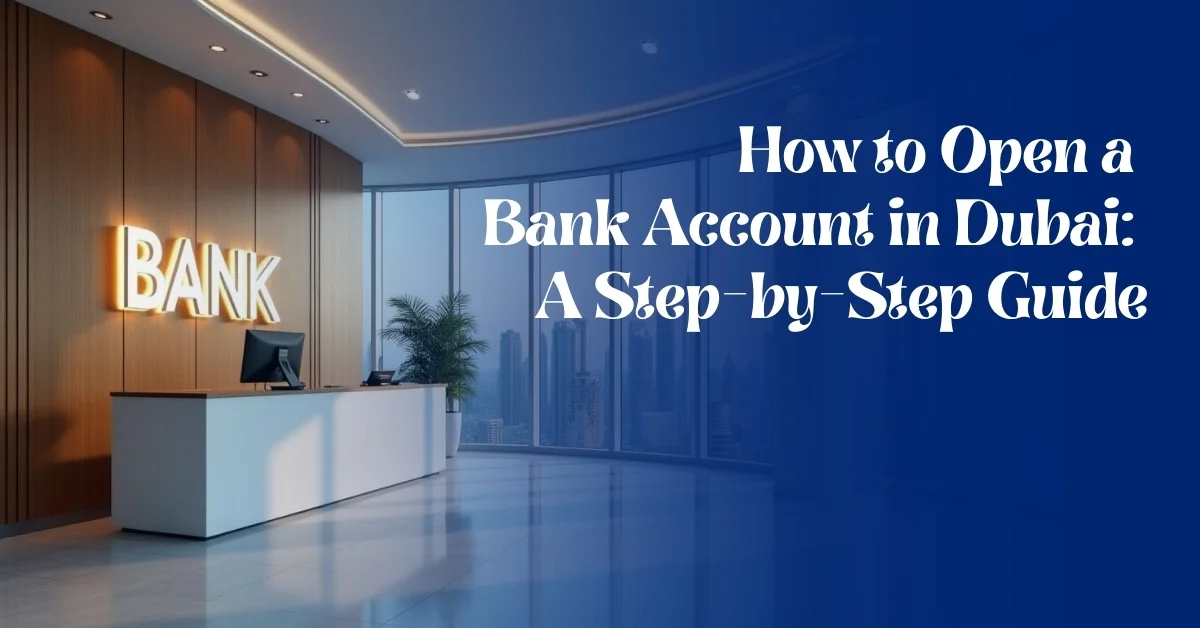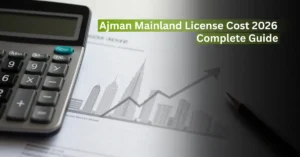Opening a bank account in Dubai is an important step for anyone planning to live, work, invest, or do business in the UAE. Dubai’s banking system is advanced, secure, and internationally connected, making it easy for both residents and non-residents to manage their finances efficiently.
Why Having a Bank Account in Dubai Matters
A local bank account is more than just a convenience; it’s a necessity for smooth financial management.
For residents, expats, and business owners, it offers:
- Seamless financial transactions for paying bills, receiving salaries, and making purchases.
- Access to Dubai’s secure banking system, which ensures funds are protected under strict regulations.
- Faster and easier salary deposits directly into your account, eliminating delays and reducing transfer costs.
Without a local account, individuals may face higher international transfer fees, difficulties in renting property, and limited access to loans or credit cards.
Eligibility – Who Can Open a Bank Account in Dubai?
Dubai allows both residents and non-residents to open accounts, though the options vary depending on visa status and banking needs.
1. UAE Residents
Residents with a valid UAE residence visa have full access to the country’s banking services. They can choose from:
- Salary Accounts: For employees to receive monthly wages directly from their employer.
- Personal Current Accounts: For everyday financial needs and transactions.
- Savings Accounts: For earning interest and building long-term savings.
These accounts often require an Emirates ID, a residence visa, and proof of income, such as a salary certificate.
2. Non-Residents and Expats
Non-residents are also eligible to open a bank account in Dubai, although their options for account types are usually more limited. Typically, they can access:
- Savings accounts with basic withdrawal facilities
- Fixed deposit accounts for long-term investments
Banks may require non-residents to maintain higher minimum balances, submit proof of address from their home country, and provide bank reference letters.
Types of Bank Accounts Available in Dubai
Understanding the different types of accounts helps you choose the one that matches your needs.
1. Current Accounts – For Day-to-Day Transactions
A current account is ideal for regular banking activities such as salary deposits, bill payments, and frequent withdrawals. These accounts often come with:
- A checkbook
- Debit card access
- Online and mobile banking facilities
They are best suited for people who need quick and easy access to their funds.
2. Savings Accounts – For Interest Earnings
Savings accounts allow you to deposit money and earn interest over time. Benefits include:
- Higher interest rates compared to current accounts
- Flexible deposit and withdrawal options
- Safe storage of funds with capital protection
These accounts are suitable for building long-term financial security.
3. Fixed Deposit Accounts – For Higher Returns
Fixed deposit accounts lock in your funds for a set period in exchange for higher interest rates. Key points:
- Terms can range from one month to several years
- Interest rates increase with longer deposit periods
- Early withdrawal may result in penalties
This option works well for people with surplus funds they don’t need immediate access to.
4. Offshore Accounts – For International Banking
Offshore accounts are designed for individuals and businesses who want to manage finances globally. Features include:
- Multi-currency facilities
- International fund transfers
- Asset protection and privacy
They are popular among expats and international investors who manage business operations across multiple countries.
Documents Needed to Open a Bank Account in Dubai
Banks require specific documents to comply with UAE regulations. Common requirements include:
- Valid passport (original and copy) for identity verification
- UAE residence visa copy (if applicable)
- Emirates ID for residents
- Salary certificate or proof of income from an employer or business
- Utility bill or tenancy contract as proof of address
Non-residents must also submit proof of address in their home country and, in some cases, a reference from their existing bank.
Step-by-Step Process to Open a Bank Account in Dubai
Opening a bank account in Dubai is straightforward if you follow the right steps. Here’s how you can get it done efficiently:
Step 1 – Select the Right Bank and Account Type
Start by comparing different banks in Dubai based on fees, account benefits, branch network, and customer service quality. Identify whether you need:
- A current account for everyday transactions
- A savings account to earn interest on deposits
- A fixed deposit account for higher returns
- An offshore account for international banking needs
Choosing the right account type ensures you enjoy the services that match your financial goals.
Step 2 – Gather Required Documentation
Before visiting the bank, prepare all the necessary documents to avoid delays. These typically include your passport, Emirates ID, residence visa copy, salary certificate, and proof of address. Make sure all documents are valid, updated, and in the required format.
Step 3 – Submit Your Bank Account Application
Most banks in Dubai offer multiple application options:
- In-person at the branch for personal assistance
- Online application via the bank’s official website
- Mobile app submission for faster processing
If you’re an expat or non-resident, applying in person is often recommended, as some banks require face-to-face verification.
Step 4 – Complete Identity and Background Verification
Once you submit your application, the bank will:
- Verify your identity documents
- Confirm your residency or non-residency status
- Conduct a background check to comply with UAE banking regulations
This process ensures compliance with anti-money laundering (AML) laws and protects both the bank and the customer.
Step 5 – Receive Approval and Activate Your Account
After successful verification, the bank will approve your application. You’ll receive:
- Your account number
- A debit card for daily transactions
- Online and mobile banking credentials
Once activated, you can start using your account for deposits, withdrawals, bill payments, and international transfers.
Best Banks in Dubai for New Accounts
Dubai is home to some of the most reliable and customer-friendly banks in the Middle East. Here are the top options to consider:
- Emirates NBD: Offers a vast branch and ATM network with strong online banking services.
- Dubai Islamic Bank: Provides Sharia-compliant solutions with attractive benefits for both individuals and businesses.
- Abu Dhabi Commercial Bank (ADCB): Flexible account packages and competitive service fees.
- Mashreq Bank: Known for its innovative mobile banking app and quick account opening process.
- HSBC Middle East: A strong choice for expats, offering global banking features and international transfer benefits.
Pro Tips for a Smooth Account Opening Process
Opening a bank account in Dubai can be quick and hassle-free if you prepare in advance. The first step is to ensure that all your documents are complete, valid, and up-to-date. Missing or expired paperwork is one of the main reasons applications get delayed.
Next, select an account type that suits your personal lifestyle or business operations. For example, a current account may work better for frequent transactions, while a fixed deposit is ideal for long-term savings.
Finally, take time to understand your chosen bank’s minimum balance requirements, service fees, and transaction limits. This helps you avoid unnecessary charges and ensures your account runs smoothly without interruptions.
Common Problems When Opening a Bank Account in Dubai
While Dubai’s banking system is efficient, there are a few challenges that applicants often face. One of the most common issues is incomplete documentation. Always review the bank’s checklist before applying to ensure nothing is missing.
Another potential hurdle is residency status restrictions. Certain accounts, especially current accounts, often require a valid UAE residence visa. Non-residents should check eligibility for savings or offshore accounts instead.
Lastly, many account holders face minimum balance penalties. To avoid this, maintain the required balance at all times or choose an account that has low or zero balance requirements. By planning, you can open your account smoothly and avoid costly mistakes.
Let Ripple Help You Open Your Bank Account in Dubai
Opening a bank account in Dubai can feel overwhelming, especially for new residents, business owners, or international investors unfamiliar with UAE banking rules. That’s where Ripple comes in. With years of experience in UAE business setup and financial services, Ripple LLC simplifies the entire process from choosing the right bank to preparing your documents and getting quick approvals. Their expert team ensures you avoid delays, meet all legal requirements, and start using your account without stress.
Contact Ripple LLC today:
📞: +971 4 250 0833
📧: info@ripplellc.ae
🌐: www.ripplellc.ae
FAQ
1. Can tourists open a bank account in Dubai?
Most banks do not offer accounts to tourists, but some may allow special savings accounts with restrictions.
2. How long does it take to open a UAE bank account?
For residents, the process can take 1–3 business days; for non-residents, it may take longer due to additional checks.
3. Is there a minimum deposit requirement?
Yes, most banks require a minimum deposit or balance, which varies depending on the bank and account type.
Conclusion
Opening a bank account in Dubai is straightforward if you choose the right bank, prepare your documents in advance, and understand the process. Whether you’re a resident looking for a salary account or a non-resident seeking an offshore account, Dubai’s banking system offers secure, flexible, and globally connected solutions. Starting early will ensure a smooth transition into the UAE’s financial system and set the foundation for successful money management.






